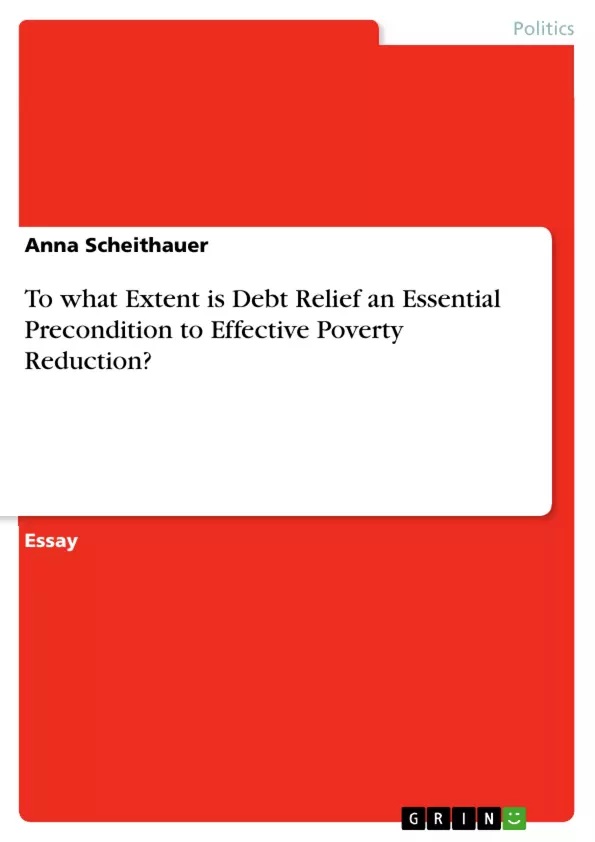In this essay I have argued that the relationship between debt relief and poverty reduction is contingent on the relationship between conditionality and creditor-debtor responsibility. Doing so, I have focused on third generation conditionality of the Post Washington Consensus, which ties debt relief to the integration of poverty reducing policies. It is based on the idea that conditional debt cancellation will lead to policy improvements, which will boost investment and social expenditures, and consequently lead to economic growth and poverty reduction. (Dijkstra, 2008) Doing so, I have concentrated on the political economy determinant of debt relief, asymmetric information, as it overshadows debt-overhung, crowding-out, and institution theory by far. (Johansson, 2010) I have clarified in the first section of the paper why this is so and have made reference to the broader debate. Asymmetric information - a situation, where one party in a transaction process has more or better information than the other (Bebzcuk, 2003, xi) - is also relevant with view to my claim being based on the premise that conditionality leads to adverse selection and moral hazard (Dijkstra, 2008), two classic examples of information asymmetry. In this sense, I have used the Enhanced Highly Indebted Poor Country Initiative (HIPCI II), which was launched by the IMF and World Bank (WB) embodying a major instrument of development policy linked to the realization of the Millennium Development Goals (MDGs) to illustrate how conditionality in debt relief triggers problems of adverse selection and moral hazard and, in turn, undermines poverty reduction (Dijkstra, 2008). I have concluded that due to the absence of a legal framework to govern activities of debt relief and commercial lending (Pettifor, 2007, 138) as well as the lack of acknowledgment to make them a matter of shared responsibility by creditors and debtors alike, policy conditionality will inevitably lead to adverse selection and moral hazard rendering deb relief not more than “a necessary but insufficient condition” (Berensmann, 2004, 321) for poverty reduction.
Inhaltsverzeichnis (Table of Contents)
- To what Extent is Debt Relief an Essential Precondition to Effective Poverty Reduction?
- From Conditionality towards Shared Responsibility
Zielsetzung und Themenschwerpunkte (Objectives and Key Themes)
This essay examines the relationship between debt relief and poverty reduction, arguing that the effectiveness of debt relief hinges on the balance between conditionality and shared responsibility between creditors and debtors.
- The role of conditionality in debt relief, particularly in the context of the Post Washington Consensus and the Enhanced Highly Indebted Poor Country Initiative (HIPCI II).
- The impact of asymmetric information on debt relief, including adverse selection and moral hazard.
- The challenges of achieving poverty reduction through debt relief, considering factors like debt overhang, crowding-out, and institutional quality.
- The need for a shift from conditionality to shared responsibility in debt relief.
- The potential for debt relief to exacerbate poverty if implemented without addressing underlying issues of information asymmetry and lack of accountability.
Zusammenfassung der Kapitel (Chapter Summaries)
To what Extent is Debt Relief an Essential Precondition to Effective Poverty Reduction?
This section explores the complex relationship between debt relief and poverty reduction, focusing on the impact of conditionality and asymmetric information. It argues that the current approach to debt relief, characterized by conditionality, leads to problems of adverse selection and moral hazard, ultimately undermining poverty reduction. The Enhanced Highly Indebted Poor Country Initiative (HIPCI II) is used as an example to illustrate how conditionality can trigger these problems.
From Conditionality towards Shared Responsibility
This section delves into the theoretical frameworks that have shaped debt relief initiatives. It examines the limitations of existing theories such as debt overhang, crowding-out, and institutional quality in addressing the complex challenges of poverty reduction. It highlights the need for a shift from conditionality to shared responsibility between creditors and debtors to ensure effective debt relief and poverty reduction.
Schlüsselwörter (Keywords)
Debt relief, poverty reduction, conditionality, asymmetric information, adverse selection, moral hazard, HIPCI II, Millennium Development Goals (MDGs), shared responsibility, development policy, political economy, economic growth, investment, social expenditures, debt overhang, crowding-out, institutional quality, good governance.
Frequently Asked Questions
What is the central argument regarding debt relief and poverty reduction?
The essay argues that the effectiveness of debt relief depends on the relationship between policy conditionality and the shared responsibility of creditors and debtors.
How does asymmetric information affect debt relief?
Asymmetric information leads to problems like adverse selection and moral hazard, which can undermine the goals of poverty reduction programs.
What is the role of HIPCI II in this context?
The Enhanced Highly Indebted Poor Country Initiative (HIPCI II) is used as an example to illustrate how conditionality can trigger moral hazard and adverse selection.
Is debt relief sufficient for effective poverty reduction?
No, the author concludes that debt relief is a "necessary but insufficient condition" unless underlying issues like information asymmetry are addressed.
What are the Millennium Development Goals (MDGs)?
They represent major development policy targets to which debt relief initiatives like HIPCI II are linked to foster economic growth and social expenditure.
- Citation du texte
- Anna Scheithauer (Auteur), 2015, To what Extent is Debt Relief an Essential Precondition to Effective Poverty Reduction?, Munich, GRIN Verlag, https://www.grin.com/document/350571



